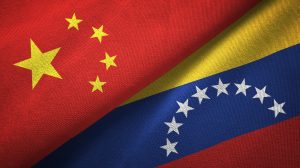Within minutes of the Maduro government declaring victory in the July 28 Venezuelan elections, China congratulated him on “his successful reelection” and for “the smooth presidential election.” China rushed into its verdict even though according to the government only 80 percent of the results had been reported – meaning at least 2 million more votes were yet to be counted.
China’s reaction has been rejected by all Latin American countries except Bolivia, Nicaragua, Honduras, and Cuba. China is also at odds with key BRICs partner Brazil and its Belt and Road partners Chile, Peru, Ecuador, and Uruguay. The major economic powers in the continent – Argentina, Chile, Colombia and Brazil – have called for evidence of what they deem a fraudulent claim of victory. Even Mexico, famous for staying out of controversies, has asked to see the Electoral Council’s voting records.
The latest poll has been branded as election malpractice by the Carter Center, the Organization of American States, and the EU. The New York Times reported that it has seen a representative list of the real election tallies showing the opposition with 66 percent of the vote.
Why has China sided so quickly with a Venezuelan government that has presided over prolonged economic disaster? China values above all a demonstrated capacity to manage an economy. One reason is the precarious nature of the vast loan portfolio that China has with Venezuela – nearly half of all Chinese loans to Latin America and the Caribbean. Venezuela committed to repaying China with oil, the amount of which has varied depending on its price.
It may not be surprising that China has turned its back on a Latin American consensus in favor of a Venezuelan regime that it has supported for 25 years. But times have changed in Latin America since Hugo Chavez was elected in 1998. China now wants to influence the whole continent. It is the major trading partner of all major countries in the region except Mexico. And 22 of the countries in Latin America are participants in China’s Belt and Road Initiative Yet China has shown little concern for the regional impact of Maduro’s government.
Neighboring countries do not share China’s view that its “strategic partnership” has benefited Venezuela. They see the 8 million Venezuelans who have left the country; many are displaced and living in Peru, Colombia, and Ecuador. These countries have suffered massive immigrant influxes, straining their economies. China has done nothing to help.
Venezuela has been trying to join the BRICS organization. Another invited member to BRICS – Argentina – has roundly condemned Maduro’s conduct. Within BRICS, South Africa and India have not yet recognized Maduro. Both countries have themselves recently had free and generally fair elections where opposition parties have gained strength. Other BRICS members like UAE and Egypt have sided with Brazil in not accepting the results. So on this issue, China, alongside Russia and Iran, is part of a small minority in BRICS, a group it is often said to dominate.
What is binding the countries of Latin America in rejecting the election fraud in Venezuela? China does not seem aware that in all the major countries in Latin America, people 50 years of age or older remember military-run governments. They have personal knowledge of the repression and imprisonment and the “disappeared” that come with such regimes. In 1977 all but four of the countries in the region were under military dictatorships. One of the exceptions was Venezuela. When I served in Venezuela as a diplomat in the 1990s, it had taken in many refugees from such dictatorships in Brazil, Chile, and elsewhere.
So Latin American leaders and electorates do not like rigged election results because when governments lose accountability bad things happen.
If China wants to build its influence in Latin America and try to create a truly “Asian century” throughout the world, it needs to show more diplomatic aplomb. China’s attraction as a diplomatic partner is largely because of its economic success. Why then would they hitch their wagon to failed economic systems like Venezuela and Cuba?
Beijing is also struggling with its diplomacy in the Russia-Ukraine conflict where one Chinese ally, Russia, invaded another key BRI partner, Ukraine. And China’s efforts to reconcile Iran with Saud Arabia have largely fallen apart as the economic stability and peace that China craves for both regions have fallen apart.
China depends on global trade and investment. It has bigger fish to fry in Latin America than bolstering a failed regime in Venezuela.

































